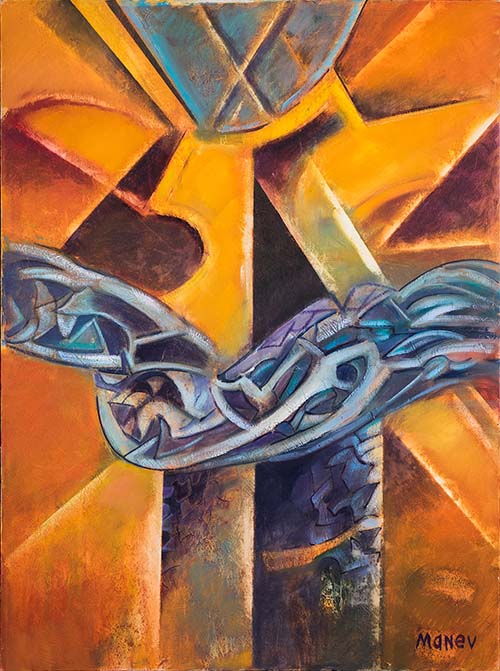
Nicola Manev and the power of cultural identity
Panayot Lyakov, 26.03.2018
No one is a prophet in his homeland. Nicola Manev is a clear denial of this rule. For more than 50 years, he has lived and worked in Paris (here he comes after winning a competition and he studies painting at the French Academy of Fine Arts) but has never interrupted his Bulgarian roots. This fateful connection, fertilising its remarkable work, is the reason to be welcomed and welcomed in the Bulgarian lands. He is recognisable - not only by the man in power and the media, but also by the people who stop and greet him on the street or on the market (his favourite place).
There is no barrier between them, and the conversation is like old acquaintances - the flowers he will plant, the sweetness of fruit, our gracious land, prices, politics, and so on. The ease of this communication is probably the tolerable price for the Parisian Kolyo Manev after having traveled half the world without losing his Bulgarian identity. And he could, with his elegant humour, as describes him quote the fantastic writer Lyuben Dilov. The glories, the self-effulgence, the obsession of "grandeur", infecting some of the nartists who have succeeded abroad, are strange to this lame trampled traveler who has long conquered the cultural audience of Europe. It's hard to describe such an artist. For a stronger impact on this portrait, I wanted to find some kind of folklore or literature, but with whom you can compare Nicola Manev?
He managed to fertilise his quests in two very different cultures - the Bulgarian and the French and thus Nikola Manev is the antipode of the exotic natives, who are elated to an exfoliating foreign perfume (I recall his narrative as a compatriot and friend of the student years, now a famous intellectual, only in French that he is very busy and can accept him next month). The first feeling of his personality is: what self-esteem, but no pride. His fascinating naturalness is logical - his place in art is not given or exchanged. Manev was never been favoured - the competition won in 1962 only opened the door for him to the world of arts. Everything else has been accomplished with a lot of work, innovation and thinking. From his first teacher, Prof. Vassil Stoilov (a family member) knows that painting is a heavy craft and the divine incarnation is more of a legend, an exception for some genius than a rule.
He told me how hard a painting is - how the vague, revolving, as in a kaleidoscope, strokes settle the canvas, go somewhere, collapse, come again, fall, darkness comes, then a glimmer comes and the image becomes clear or disappears irrevocably.
Adventure with an unknown end you need to be prepared for. The magnificent technique has always helped him, but the distinctive thing in his creations is the so-called modernity - in my opinion, this is the expression of visible things in invisible ways. As an Italian fisherman once said to them (they understand art because the Renaissance is permeated in their genes): "Your abstract paintings are much more realistic than figurative ones." The same is recognised by the well renown French poet Alain Bosquet, a friend and admirer of the artist, devoted a book to his art.
This assessment is a discovery that most art critics have probably not reached. But often ordinary connoisseurs have a more accurate sense of authentic art and recognise it unmistakably. Fisher's assessment shows the natural transition to the fantasy visions of his painting, in which there is no manners and hollow abstraction. The painter Nicola Manev has not broken the divine fusion with the eternal human inspirational - Nature and transforms it into fine art. With his brush, heavier than a spear and more acute than a sword, Nikola Manev leads us into the sacred battle against the walls of mediocrity and the fears that are part of the everyday life. The renaissance man from Paris shows the power of cultural identity and its transformation into fine contemporary artworks .
The creative power is also based on the tradition "To serve his home land”, which Nikola Manev generously continues. A beautiful old house with a large yard and garden in the town of Chirpan has been restored and donated to the municipality together with many paintings for a future museum. There is an open and constant exposure of his talent. Every year the concert for the celebration of Chirpan is held in the yard.
The other old house, bought and restored with authentic materials by Nikola Manev, is located in the same municipality, in a small village, where the mother of the artist was a teacher. It is like a bit of the past. This pure renaissance work of the artist is almost unknown outside of Chirpan because he does not like to praise and self-proclaim himself. A very typical for a renaissance man behaviour. It is enough for him to maintain the livelihood of the Bulgarian spirit.
With his talented and modern art, Nicola Manev is a worldwide acknowledged contemporary artist, that has never forgotten his roots, always an inspiration for a true artist.
